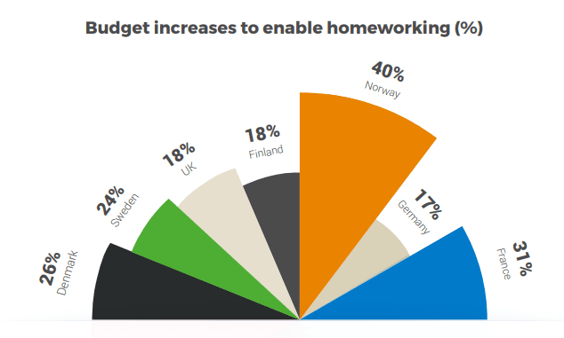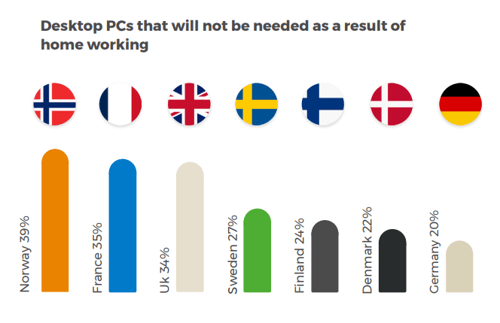For many companies, the IT department has been the unsung hero of the crisis, playing a pivotal role in a rapid transition to remote working. Our research The State of Business IT confirms that a big shift is underway - 84% of companies purchased additional IT to enable employees to work at home, and 60% plan to continue to allow this flexibility.
Refocusing IT Strategy & Budget

From ways of working to IT investment plans, the pandemic has induced significant change.
Over half of IT decision-makers cited Covid-19 as the top factor driving changes in spending in 2021. Other top factors include changing IT infrastructure (43%) and updating software to reflect the needs of the current business environment (33%).
Our research reveals that the majority (84%) of firms across Europe made quick investments at the beginning of the Covid-19 outbreak to enable employees to work from home, with an average 24% increase on their 2019 budget to provide new IT equipment.
This initial outlay supported the emergency transition, but more is required. Overall, firms were expecting budgets to rise (61%), with an average increase of almost 25% in 2021.
Supporting the New Mobile Workforce
Technology investment this year will be heavily influenced by the changes required to manage the Covid-19 pandemic and support a new-look mobile workforce, with the priority purchases for being laptops (52%) followed by IT software (35%) and cloud based infrastructure (26%).

This year, IT strategies were anticipated to increasingly focus on facilitating social distancing (47%) and increased home working (46%) to reflect the changing needs of employees.
As a result of the COVID-19 pandemic, companies clearly expect the increase in home working to become a permanent trend, with 60% planning to allow employees/more employees to work from home, and 56% planning to offer more flexible working hours. Investment plans also support the change, as nearly half plan to increase investment in remote working.
Organisations are now investing in a mobile workforce for the long term and the temporary and emergency technology packages put in place to enable home working will require review. For many this will represent a significant and unplanned upfront cost, potentially draining company cash reserves when they can least afford it.
Desktops abandoned in favour of mobile IT
The change has a left huge number of desktop PCs sitting idle in offices across Europe. Almost one third of desktop PCs have been ‘made redundant’ and left abandoned in office spaces, as European workforces shifted to work from home during the Covid-19 lockdown.

Our research revealed that even as many businesses start to head back into the office, almost a quarter of desktop PCs are not expected to be required. More than half of IT decision makers said increased spending in laptops would be the main focus for IT investment, echoing trends in the industry which show a boom in demand for mobile technology.
Redundant business technology represents both an opportunity and risk. It often holds residual value which businesses can capitalise on to fund their transition to new, flexible ways of working. But with many businesses still failing to recognise this opportunity, this now redundant IT equipment could be at risk of ending up in landfill. We refurbish and resell over half a million devices a year as part of the REstepIT service.
Read the full report here as it explores themes including:
• Flexible working and the impact of Covid-19
• Electronic waste and the need for sustainable IT
• Access vs ownership – a new way to acquire and manage IT